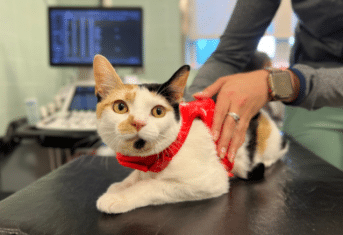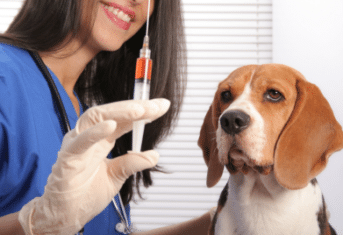Preventing Cancer in Your Pet

Preventing Cancer in Your Pet
November is National Pet Cancer Awareness Month. Pet cancer can be just darn bad luck, but some cancers have a known cause. While you can’t change your large breed dog’s risk for developing osteosarcoma or your pug’s predisposition to mast cell tumors, I want to make my readers aware of some practical tips to prevent cancer in their pet.
Consider Spaying or Neutering Your Pet
Spaying your female dog before her first heat significantly decreases her risk of breast cancer. Spaying removes the ovaries and uterus, and the infrequent diagnosis of ovarian and uterine cancer in dogs is a direct result of this frequently performed surgery.
Neutering a male dog similarly decreases the risk of testicular cancer, although this is not a highly malignant form of cancer in dogs. The role of neutering in preventing prostate cancer is less clear and some research suggests it may not prevent prostate cancer in dogs. Clearly, this is an area where more research is needed.
Minimize Sun Exposure
Exposure to the sun’s ultraviolet rays is a known cause of skin cancer in humans. Because pets wear a furry coat every day, their sun exposure is minimal, but cats with light colored fur around their eyes, nose and ears where the fur is thin can develop squamous cell carcinoma from prolonged sun exposure. Light coated dogs that like to sun bathe on their backs can develop skin cancer in the sparsely haired area on their tummies. If your pet spends a lot of time outdoors and has a light coat color, investigate options for sun protection.
Get Your Portly Pet Thinner
Obesity is the number one nutritional disease of pets in America. Obese pets suffer from several illnesses including diabetes, hypertension and arthritis. Cancer may not be the most common disease associated with obesity, but it can lead to cancers affecting the breast and bladder, which have been associated with obesity in pets.
Avoid Toxins
Lymphoma is the most common tumor treated by veterinary oncologists. While genetics play a role in the development of this disease in golden retrievers, boxers, bull mastiffs and Scottish terriers, veterinary oncologists know little about the cause of this disease in most dogs. One study from a group of Italian veterinarians suggested dogs living in industrial areas and also dogs exposed to paints and solvents developed lymphoma at a younger age than dogs not exposed to those chemicals, so keep your dog away from any painting projects or your art studio.
Limit Injections
In the early 1990s, an astute pathologist recognized a new tumor in cats. The tumors, belonging to the sarcoma family of tumors, were found at the sites of vaccination. The tumors occur in only a small number of vaccinated cats, but when they occur, oncologists must use all available treatment options to control the tumor. The occurrence of these tumors, resulted in changes to vaccination protocols. Today, veterinarians use fewer vaccines, manufactured to maximize feline safety. Administration of vaccines at non-traditional sites is also under investigation.
Prevent Feline Leukemia Virus Infection
The feline leukemia virus is a cancer causing virus of cats. Before control measures like vaccination against the virus were instituted in the 1980s, veterinary oncologists treated hundreds of young cats suffering from lymphoma near their hearts. Today, we see very few cases of feline leukemia virus-induced lymphoma because this disease is preventable if you keep your cat indoors and away from cats infected with the virus.
Quit Smoking
In people, 9 out of 10 lung cancers are caused by smoking. Your doctor would want you to quit smoking to decrease your risk of lung, throat and bladder cancer among others. But did you know your smoking can cause cancer in your pet? Dogs living with a smoker have a greater risk of developing nasal cancer, and cats exposed to secondhand smoke have a greater risk of developing lymphoma and oral squamous cell carcinoma.
Following these tips will help to decrease the number of pet cancer cases requiring veterinary oncologists to #CurePetCancer less often and that should make us all happy.

































